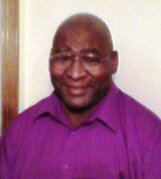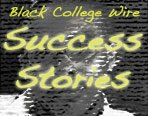| Exile and Trial of the Campus Echo |  |
 |
 |
| By Ashley Roque -- Black College Wire | |
|
The September 1971 memo from then-Chancellor Albert N. Whiting was clear enough: “I am here announcing that all funds for the publication of the Campus Echo have been temporarily suspended …” The chancellor’s memo threatened to permanently suspend University sponsorship of the Campus Echo unless a consensus could be reached with the Campus Echo editor regarding “standard journalistic criteria.” Another University-sponsored edition of the Campus Echo would not appear until the fall of 1973. During the intervening two years, the matter was tried first in district courts and then in federal appeals courts. 
Personal photo
Jae Joyner today
The case, officially titled Joyner v. Whiting, ruled that the University had violated the First Amendment by cutting funding for the Campus Echo. In a 3-1 ruling, the Fourth Circuit U.S. Court of Appeals in Richmond overturned the lower court’s ruling in favor of Whiting with the following statement: Joyner, recalling the verdict, said his first reaction was relief. “I just sat down in the stairwell and cried,” he said. Since the verdict, Joyner v. Whiting has been repeatedly cited, according to Mike Hiestand, an attorney and legal consultant for the Student Press Law Center, which is dedicated to protecting the free speech of students. “Any sort of case involving college press laws definitely has Joyner v. Whiting as support for the defense of college student's freedom of speech," said Hiestand. The trouble began with the September 16, 1971 issue of the Campus Echo. The front-page banner headline read: IS NCCU STILL A BLACK SCHOOL. The headline on the top story read: LOOK AND YOU SHALL SEE. No byline is given to the writer of the article –— which reads more like an editorial than a news story — but court documents indicate that the story was written by then-editor-in-chief Jae Joyner. In the article, Joyner expresses his concern that too many white students are attending NCCU. 
Campus Echo
Publication that led to lawsuit
White students, he writes, are getting “special privileges” and “don’t have to stand in long registration lines.” And now, he writes, whites are “teaching us. “Our institutions are being taken away from us,” writes Joyner, who supports his case with a quote from civil rights activist H. Rap Brown: “‘I do what I must out of the love for my people. My will is to fight. Resistance is not enough. Aggression is the order of the day.’” Page two of the edition includes this announcement:“ATTENTION: Beginning next issue The Campus Echo will not run white advertising.” The edition’s Afro-centricism is highlighted by the Campus Echo nameplate, on which the words “Campus” and “Echo” are separated with an image of Africa and the word “KoKayi.” The article ends with: “Now will you tell me, whose institution is NCCU? Theirs? Or Ours?” Elsewhere, Joyner had announced that only black students would be allowed to work at the Campus Echo. Chancellor Albert Whiting’s response was swift. In a memo announcing that University funding would be cut from the paper, he wrote that the September 16 issue of the Campus Echo didn’t meet “standard journalistic criteria” and that it didn’t “represent fairly the full spectrum of views on this campus.” He said that Joyner’s article was full of “racial divisiveness and antagonism.” Whiting, who had been advised by North Carolina’s attorney general that the University could lose federal funding, stated that Joyner was promoting segregation and that he violated equal protection guaranteed by the Fourteenth Amendment and the Civil Rights Act of 1964. “The point that I wish to make,” wrote Whiting in the memorandum, “is that as a State-Supported Institution especially, but also in terms of what is morally and legally right, this institution is not a ‘Black University’ and does not intend to become one.” In a recent interview, Whiting said, “The schools were already integrated when Joyner became the editor. Joyner was violating the law by not allowing white students to write for the Echo.” Immediately after Whiting cut funding, students begin picketing in front of his home. Whiting’s decision to cut funding was backed by the UNC Board of Governors. The case became a showdown between free speech, protected by the First Amendment, and equal rights – in this case for whites – protected by the Fourteenth Amendment and the 1964 Civil Rights Act. Twice in U.S. history, the Supreme Court has declared it unconstitutional to censor publication: in 1931 (Near v. Minnesota) and in 1971 (New York Times Co v. United States). In Tinker v. Des Moines Independent Community School District, a case where high school students were forbidden to wear black armbands with peace symbols, the courts ruled that the First Amendment applied to public schools as long as the speech did not disrupt of school operations. According to the Tinker standard, public universities cannot take away funding just because the material is controversial or because administrators don’t like what is being said. But Joyner and Harvey White did not win everything. The courts held that Whiting had the right to refute Joyner’s black-only policies, a position Joyner had already conceded earlier with a statement that white students could work at the Campus Echo and that white companies that employed on an equal opportunity basis could advertise with the paper. Acording to David Pollitt, the Chapel Hill civil rights attorney who represented the Campus Echo in the Fourth Circuit Court of Appeals, the case must be understood in light of the late 1960s and the early 1970s. These were the years of Malcom X, the Jackson State killings, the Black Panther Party and the Vietnam War. “The general atmosphere of those years was troublesome,” said Pollitt, who explained that Joyner’s position reflected the atmosphere of revolution and turbulence. “To combat the racism of the time, there grew a sense of black militancy with the black power movement to fight the racism, and Joyner was just part of those times,” said Pollitt. In a recent interview, White, the SGA president who joined Joyner in the case, explained that with integration, many people felt that HBCUs would lose their heritage and would be unable to provide the support African Americans needed. “Because the chancellor did not include students in making this decision, we felt that it should not be the president’s prerogative to permanently cut the funding,” said White. White said students tried to keep an off-campus version of Campus Echo going when the funding was cut. “To raise funds, we put on a dance, had house parties, and we gave money out of our own pockets,” he said. "There were even a few professors who helped support us financially.” According to Tom Evans, an English professor who came to the University in 1969, the Durham Morning Herald, which later merged into the Herald Sun, helped fund some of the off-campus publications. In a recent interview, Joyner said his decision to take on the University created a lot of personal difficulties and that now, he is simply “tired” of having the issue brought up. He explained that while there was support from many student leaders, many students saw his decision to take the University to court as “radical.” He said that many students complained that he was doing more harm than good. “People who I thought were friends walked away when the situation got tough,” Joyner said. “I lost a lot of friends for standing up for the Echo.” After graduating, Joyner went on to teach in several public elementary and middle schools in North Carolina. He now teaches at an alternative school in Petersburg, Va. Joyner and his wife have raised three children. Harvey White went on to earn a Ph.D. in public administration from the University of North Carolina at Chapel Hill. He was a dean of the School of Public Policy and Urban Affairs at Southern University in Louisiana and now teaches public affairs and international development at the University of Pittsburgh. Before coming to NCCU, Whiting was the dean of faculty at Morgan State University. Whiting worked at NCCU for 16 years. He served as president from 1967-1972 and chancellor from 1972-1982. During his tenure as chancellor, North Carolina College became N.C. Central University. Whiting helped launch the University’s School of Business. Evans recalled that years after the landmark case, he saw Joyner and Whiting at a reception at the NCCU Art Museum. The commotion had settled,” he said. “Joyner was in a three- piece suit and not his army fatigues. Joyner and Whiting were civil and respectful.” Ashley Roque writes for the Campus Echo, the North Carolina Central University student newspaper, which originally published this article. |
|
| Posted Feb. 17, 2010 |
| < Prev | Next > |
|---|



